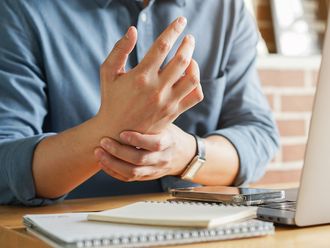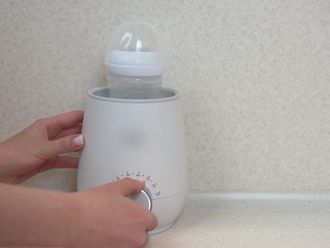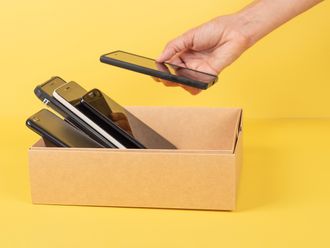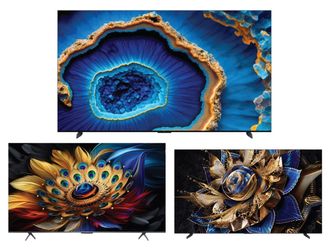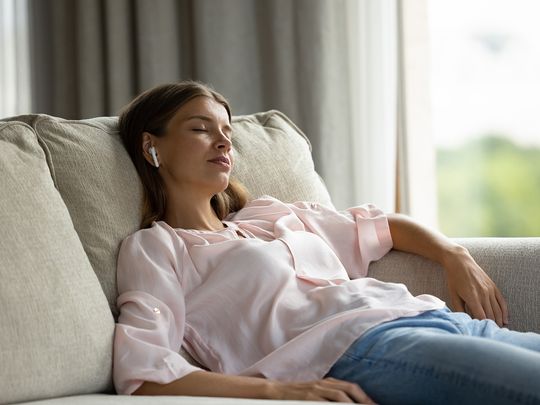
If you're tired of tossing and turning like a rotisserie chicken at night due to stress or work demands, it's time to upgrade your sleep game with the latest tech gadgets.
From tracking devices disguised as stylish rings to gadgets that help block out all distractions, cutting-edge devices offer a range of features to improve your sleep quality and create a more restful environment that will benefit your physical and mental well-being.
Although sleep-promoting gadgets and gear can help Dr Robert Chandler, clinical psychologist and managing director at Lighthouse Arabia, Dubai, shared a caveat: "Human beings have existed for hundreds of thousands of years without sleeping aids. Before investing in what are often expensive gadgets and technology, ensuring that one is behaviourally doing everything one can to promote good sleep would be my strong guidance."
We also sought the expertise of Asha Javeri, a sleep specialist at Good Health, a Dubai-based wellness clinic. Scroll down to learn from our experts, how disrupted sleep can affect our bodies, and what we can do to cope.
Don't forget! For prompt, next-day delivery, become a Prime member.
1. Best Overall: Oura Ring
Pros
- Accurate sleep tracking
- Heart rate monitoring
- Temperature tracking
Cons
- Rather expensive
The Oura Ring is more than just a stylish accessory; it's a powerful tool for optimising your sleep and overall health. This discrete wearable device harnesses advanced technology to track your sleep patterns, providing you with valuable insights into your rest and recovery. How does it work? Well, it utilises a combination of sensors to monitor your sleep. It also tracks changes in your body temperature throughout the night, and measures your heart rate variability, a key indicator of sleep quality. By analysing these data points, the Oura Ring can accurately determine your sleep stages: Light, deep, and REM (rapid eye movement). This information helps you understand the quality and duration of your sleep and identify any patterns or disruptions. Javeri explained: "By tracking your sleep patterns, you can gain a better understanding of your sleep habits, including how long you sleep, how much time you spend in different sleep stages, and how often you wake up during the night. This awareness can help you identify areas where you can make improvements." This device also helps you set sleep goals. For example, if you're consistently getting less than seven hours of sleep per night, you can aim to increase it gradually. It also provides a daily score that summarises your overall sleep quality. It can also offer personalised recommendations based on your sleep data, such as adjusting your bedtime or creating a more relaxing sleep environment. You'll feel less stressed too, as it can help you identify and manage stress, promoting overall well-being. "If you're making changes to your lifestyle, such as exercising more or avoiding caffeine before bed, tracking your sleep can help you see if these changes are having a positive impact," explained Javeri. Overall, it gives you a sense of motivation and accountability, and you feel encouraged to stick to healthier habits.
Bonus: Buy with zero per cent installments and pay Dh108.37 for 12 months with select banks.
Warranty: Amazon offers one-year warranty of Dh80 and two-year extended warranty of Dh132.
2. Best Sleep Earbuds for Side Sleepers: Kastwave Sleep Earbuds
Pros
- Noise cancellation
- Comfortable
- Compact design
- Water-resistant
Cons
- Some users have complained of discomfort
Say goodbye to distractions during sleep with these tiny earphones by Kastwave. These sleep earbuds are designed to be worn comfortably while sleeping on your side. Unlike traditional headphones, they are smaller and have a flatter profile, reducing pressure on your ears and ensuring a comfortable fit. Many sleep earbuds also feature noise-cancelling technology to block out unwanted sounds, creating a peaceful environment for sleep. They block out unwanted sounds, such as traffic noise, snoring, or construction, to create a peaceful sleep environment. Moreover, they're wireless, allowing you to move freely in bed without worrying about tangled cords.
3. Best Alarm Clock: Philips SmartSleep
Pros
- Regulates circadian rhythm
- Light therapy
- Customise sleep and wake-up routines
Cons
- Effects may vary from person to person
A lamp that mimics sunrise and sunset? Sign us up! The Philips SmartSleep Connected Sleep and Wake-Up Light is a rather unusual, yet intriguing solution designed to enhance your rest and well-being. With its innovative features and advanced technology, this light can help you establish a healthier sleep routine, and wake up feeling refreshed and energised. Javeri explained why exactly this is necessary: "Exposure to light suppresses the production of melatonin, a hormone that promotes sleepiness. As the light intensity increases, your body gradually reduces melatonin production, making it easier to wake up feeling refreshed." Using a sunrise clock can help align your sleep-wake cycle with the natural light-dark cycle, improving overall sleep quality and reducing feelings of grogginess upon waking, she added. Moreover, this has an edge over regular and traditional alarm clocks, which jolt you awake with a sudden loud noise, as sunrise clocks gradually increase light intensity over a set period. It mimics the natural process of dawn, signaling to your body that it's time to wake up. The light gradually brightens or dims, mimicking the natural light cycle and helping your body adjust to sleep and wake-up patterns more naturally. That's not all: You can also connect to the Philips SleepMapper app to track your sleep patterns, set alarms, and customise your wake-up and sleep routines. It has a sensor too, which can measure your bedroom's temperature, noise, light, and humidity levels, providing valuable insights into your sleep environment. You can also choose from a variety of soothing sounds, including Nature sounds, ambient music, or your favourite radio station, to accompany your wake-up or sleep routine.
4. Best Sleep Machine: LectroFan High-Fidelity White Noise Machine
Pros
- Comapct design
- High-quality sound
- Variety of sounds
Cons
- No digital display
Whether you're struggling with insomnia, trying to focus on work, or simply seeking relaxation, the LectroFan can help. It has high-fidelity sound, so you can experience crystal-clear audio. Feel free to choose from a variety of sounds, including white noise, fan sounds, rain, and ocean waves, to mask unwanted noises and promote relaxation. It is also small and portable, making it easy to take with you wherever you go. Javeri said the soothing sounds of the LectroFan can help alleviate stress and anxiety. "White noise, a combination of all audible frequencies at equal levels, can cover up sudden noises like traffic, neighbours, or pets. This prevents your brain from being startled awake, allowing you to stay asleep," she explained. The consistent sound of white noise can create a soothing and relaxing atmosphere, helping to calm your mind and reduce stress. As a result, consistent white noise can help you fall asleep faster and stay asleep longer, leading to improved overall sleep quality.
Warranty: Amazon offers a one-year warranty of Dh29, and two-year warranty of Dh41.
5. Best Diffuser: Asakuki Essential Oil Diffuser
Pros
- Elegant design
- Adjustable mist modes
- Ultrasonic technology
- Quiet operation
Cons
- Requires regular maintenance
- Limited coverage
Out of all essential oils, lavender is touted as the best for a good night’s rest. Inhaling its fragrance is believed to relax the body enough to wade off anxiety. Add a few drops of lavender essential oil to a diffuser before bed and you’re good to go. Our pick is Asakuki's contemporary diffuser that doubles as décor for the room. With the ability to act as a night light, the diffuser has seven light settings, and it can function as a mist diffuser humidifier, atomiser, and air freshener. What’s more, your device comes with a remote control to get you started immediately. Explaining why essential oils help, Javeri added: "The calming scents of essential oils can help reduce stress and anxiety, making it easier to relax and fall asleep. It's an effective mood-booster, too."
6. Best Humidifier: Levoit Humidifier
Pros
- Effective humidification
- User-friendly design
- Auto shut-off
Cons
- Requires maintenance
Do you suffer from stuffy nasal passages, dry cough and an even drier throat when sleeping? Air conditioners tend to dry out moisture from the surrounding air, sometimes disrupting your sleep in the middle of the night. Turn on Levoit’s 2.4-litre humidifier for the bedroom or the whole house; at under 21 decibels, the humidifier works at a volume that's quieter than a whisper. Not only does it help prevent dry eyes, but your skin will feel moisturised when you wake up. The humidifier also automatically shuts off when the water tank is empty, preventing damage and ensuring safety. This device keeps your furniture and floors dry because it releases super-fine mist that doesn’t sink. Explaining why a humidifier helps, Javeri said: "Dry air can contribute to sleep disturbances, such as congestion and snoring. A humidifier can help alleviate these problems and promote better sleep."
7. Best Eye Massager: Renpho Eye Massager
Pros
- Effective relief
- Heat therapy
- Portable and foldable
Cons
- No manual adjustment
How about unwinding with Renpho's Eye Massager? Designed to alleviate eye strain, puffiness, and improve sleep, this device combines compression, heat, and vibration for a relaxing massage. Equipped with two acupressure motors, it targets specific points around the eyes, offering a soothing kneading sensation. Built-in heating pads provide relief from eye fatigue and dryness caused by excessive screen time. For easy charging, simply connect the massager to your laptop, phone adapter, or power bank using the included USB cable. You can enjoy a few minutes of relaxation at the end of each day to rejuvenate your eyes and mind.
What disrupts sleep?
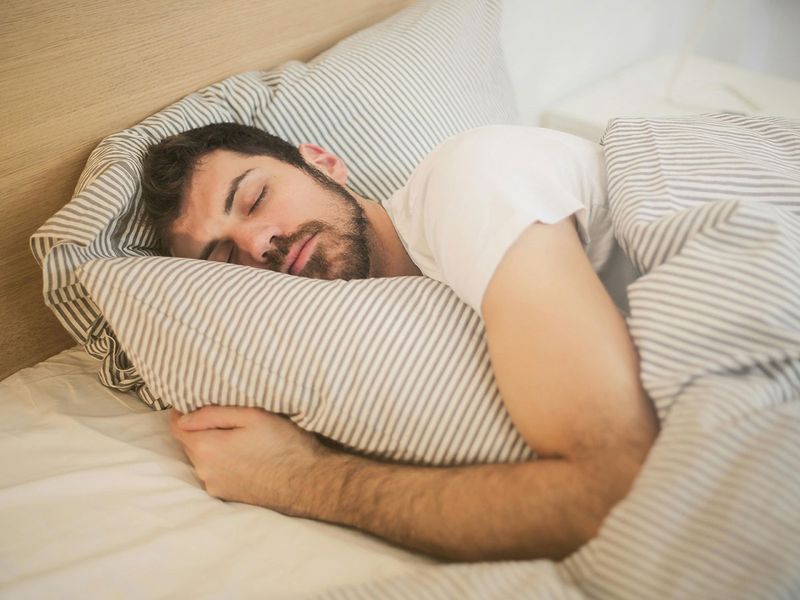
The daily hustle we're exposed to, unfortunately, isn't conducive to a consistent sleep routine, and many factors come into play.
Dr Chandler said: "There are factors at the societal level that impact the quality and duration of our sleep - devices, screens and technology compete for our attention, as well as nightlife culture and socialisation into the early hours that can disrupt our sleeping patterns. The GCC has some of the longest working hours in the world, and working long into evening and night does not allow for a period of disconnection from work and home."
Moreover, our minds are often racing with thoughts of work, relationships, or past mistakes. This constant rumination can lead to heightened stress and anxiety.
Javeri explained that chronic stress elevates cortisol levels, making it difficult to relax and fall asleep. It can result in insomnia and difficulty winding down. Many people try to tackle unfinished tasks at night, believing they have more time, but this behaviour can actually exacerbate anxiety and hinder productivity. Anxiety can disrupt REM sleep, the stage where vivid dreams occur. Nightmares and sleep disturbances can further fuel anxiety, creating a vicious cycle. As a result, the cycle of sleeplessness and crippling anxiety can significantly impact well-being.
Moreover, there are other factors that affect sleep, too. To cope with stress, people might turn to unhealthy habits, including refined carbs and sugar. The body is then alert and stimulated; sugar levels fluctuate, affecting the quality of sleep. People also start falling into the trap of irregular sleep schedules and unhealthy lifestyle patterns, and follow poor dietary habits, like consuming coffee before sleeping, which keeps the body alert, explained Javeri.
Dr Chandler added: "On an individual level, inadequate room temperatures, disturbances caused by others sleeping in the same room and/or bed, not having a suitable nighttime routine, and an over reliance during the day on caffeine are just some of the common factors that contribute to poorer quality and quantity of sleep."
How does poor sleep affect our bodies?
You might be surprised by the far-reaching impact of a sleepless night.
Dr Chandler explained: "Pulling an 'all nighter' leads to a 40 per cent reduction in learning the following day. Individuals are also likely to be more reactive, irritable and anxious the following day, and more likely to crave high fat and high sugar foods. Just about every bodily process is in some way mediated or regulated by sleep, and not getting enough places our physical health in a compromised state. Individuals with consistently poor sleep routines are at increased risk of heart disease, diabetes, mental health problems, and Alzeimer's disease, and this list is by no means exhaustive."
So how do you fix your sleep patterns?
Start with a routine. By aiming for seven to nine hours of uninterrupted sleep each night and maintaining a consistent bedtime, you're training your internal clock, according to Javeri. This consistency helps regulate your sleep-wake cycle, making it easier to fall asleep and wake up feeling refreshed. Our routines signal to our brain the difference between day and night, helping to reduce stress and promote better sleep.
Dr Chandler said: "Consistency is key; going to bed and waking at approximately the same time every night is one of the single most effective things any of us can do. The body is designed to work by its own internal clock - its circadian rhythm - and is simply not designed to sleep for four hours one night, and then crash by 7pm the next day. This means, as much as possible, avoiding laying in and staying up very late in irregular patterns."
You could also set up a bedtime routine that urges the body to wind down. Dr Chandler advised beginning your night routine at least two to three hours before bed. He listed some examples: "Reducing bright lights, that is, turning on lamps or dimming main lights, having a hot bath or shower an hour or two before bed, ensuring no blue light and/or screens at least 60 minutes before bed, and if possible ensuring that the bedroom is at an ambient temperature of 16 to 20 degrees, which supports the body's natural drop in temperature as it prepares for sleep. Avoiding food, particularly harder to digest food, like meat, thre to four hours before bed can also be useful - otherwise energy is being used for digestion, rather than the same energy being used for the restorative processes taking place during sleep."
When it comes to devices, certain well-chosen items can help support your sleep and bedtime routines. Dr Chandler said: "Devices that are used wisely and consciously can be beneficial for some people. Sleep trackers offer a way for us to become more conscious of our sleeping patterns, and help us to identify factors that may be costing us in terms of our sleep. On the other hand, I have also known clients become fixated or obsessed by their 'sleep scores' which paradoxically then causes anxiety and stress; and anxiety is the arch nemesis of sleep. My guidance would be: use sleep trackers to build self-awareness and for pattern recognition, but don't aim for perfection."
He also shared that "sunrise alarm clocks have some scientific evidence to support their use, particularly in individuals that have seasonal affective disorder". But at the end of the day, its effectiveness comes down to your own behaviour. Dr Chandler said: "It makes intuitive sense that any device that supports the body's natural mechanisms for waking is likely to be beneficial. I would argue though, that any benefit from a device of this nature will be negated by poor sleeping patterns and routines - if you've stayed up until 2am eating, do not expect to awaken blissfully by the sunrise alarm clock at 6am! A device is not a substitute for the harder work of consistent sleep-promoting behaviours."
Our recommendations are independently chosen by Gulf News editors. If you decide to shop through links on our website, we may earn an affiliate commission, as we are part of Amazon Services LLC Associates Program.



